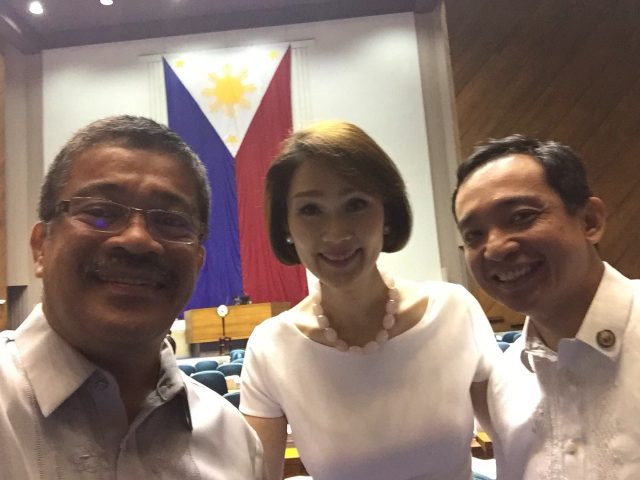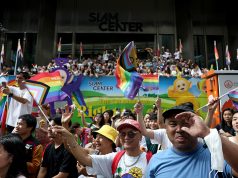
MANILA – The House of Representatives approved, 198-0, on third and final reading on Wednesday the proposed SOGIE Equality Act.
House Bill 4982 or the SOGIE Equality Act seeks to address all forms of discrimination, marginalization and violence on the basis of sexual orientation or gender identity or expression, and promote human dignity.
SOGIE stands for “sexual orientation or gender identity or expression.”
The bill prohibits and penalizes discriminatory acts by a fine of not less than P100,000 and not more than P500,000, or imprisonment of not less than one year but not more than six years, or both.
“Makibeki, wag ma-shokot! Labanan ang diskriminasyon at pang-aapi!” Bayan Muna partylist Representative Carlos Zarate said.
“Araw-araw, nakakaranas ng iba’t ibang porma ng disriminasyon ang mga LGBT. Ang mga prejudicial practices and policies ay kalakhan hindi naisusulat at isinisiwalat pero ito ay pinapairal sa mga paaralan, sa mga opisina, sa mga institusyong publiko at pribado, at iba pa. Kaya naman, mahigpit ang pangangailangan na magkaroon ng batas na kikilala sa karapatan ng mga LGBT at magpaparusa sa mga lalabag rito,” he added.
Siquijor Rep. Ramon Rocamora said the chamber should say “no to discrimination and yes to love.”
The measure listed down as discriminatory the following acts on the basis of sexual orientation or gender identity or expression:
-Denying access to public services;
-Including sexual orientation or gender identity or expression, as well as disclosure of sexual orientation, in the criteria for hiring, promotion, transfer, designation, work assignment, re-assignment, dismissal of workers, and other human resource movement and action, performance review, and in the determination of employee compensation, access to career development opportunities, training and other development interventions, incentives, privileges and allowances;
-Refusing admission or expelling a person from any educational or training institution;
-Imposing disciplinary sanctions, penalties harsher than customary or similar punishments, requirements, restrictions or prohibitions that infringe on the rights of students;
-Refusing or revoking the accreditation, formal recognition, registration or plan to organize any organization, group, political party, institution, or establishment in educational institutions, workplaces, communities, and other settings;
-Denying a person access to public or private medical and other health services open to the general public;
-Denying an application for or revoking a professional or other similar kind of license, clearance, certification on, or any other similar document, except marriage license, issued by the government;
-Denying a person access to or the use of establishments, facilities, utilities, or services, including housing, open to the general public;
-Subjecting or forcing any person to undertake any medical or psychological examination to determine or alter, or both, the person’s sexual orientation or gender identity or expression without the expressed approval of the person involved, except in cases when the person involved is a minor and below the age of discernment;
-Harassment, coercion, or threats committed by members of institutions involved in the enforcement of law and the protection of rights of any person;
-Publishing information intended to out or reveal the sex, sexual orientation, or gender identity or persons without their consent;
-Engaging in public speech, except religious speech meant to shame, insult, vilify, or which tends to incite or normalize the commission of discriminatory practices against LGBTs;
-Subjecting persons or groups of persons to harassment generally defined as unwanted conducts, pattern of conduct, act, or series of acts which tend to annoy, insult, bully, demean, offend, threaten, intimidate, alarm, or create hostile or emotionally distressing environment, or put them in fear of their safety;
-Subjecting a person to a gender profiling or to any investigatory activities, which include unnecessary, unjustified, illegal, or degrading searches to determine whether an individual is engaged in an activity presumed to be unlawful, immoral or socially unacceptable;
-Preventing a child under parental authority, custody, or guardianship from exhibiting or expressing one’s sexual orientation or gender identity, or manifesting rejection of such child’s sexual orientation or gender identity or expression by inflicting or threatening to inflict bodily harm;
-Subjecting a person to any other analogous acts that shall have the effect or purpose of impairing or nullifying the enjoyment, recognition or exercise of a person’s rights and freedoms.
The bill mandates existing Women’s Desks in police stations to be renamed as Women, Children, LGBTQ++ Protection Desk, which will attend to complaints.
It also orders establishments to make available their existing toilets with facilities designated for persons with disabilities as gender-neutral toilets.









